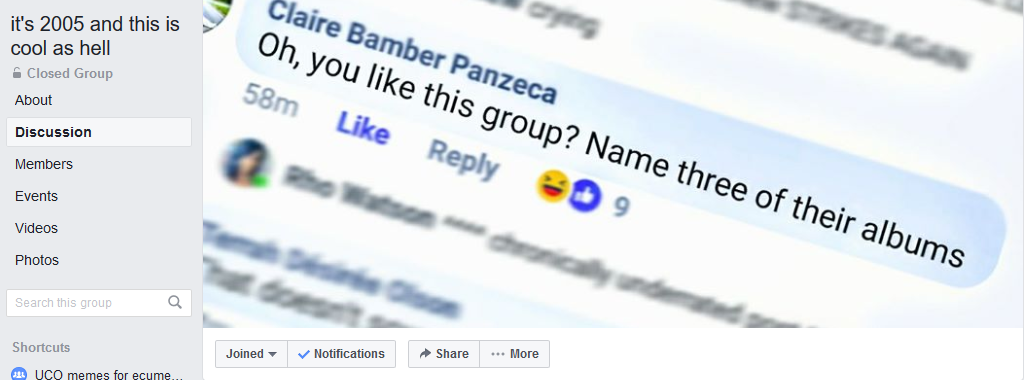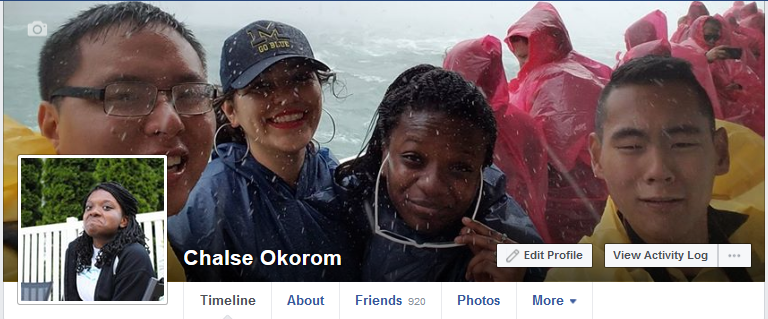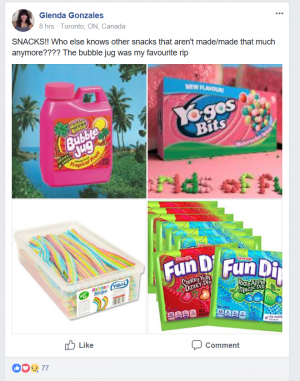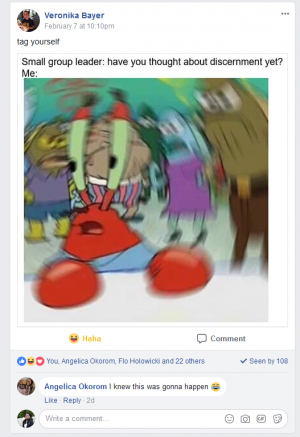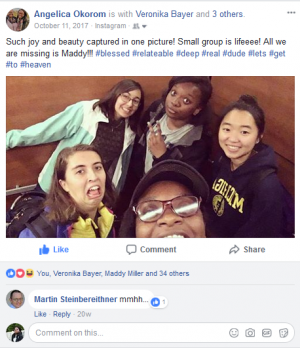User:Chalse Okorom
When I think of Facebook, I have a certain vision of what the service does for you. I can post pictures, comment, share content with friends, etc. I can essentially create a curated version of myself through posting all the positive elements of myself and my life into a neat package of inauthenticity. This is what a lot of people do. I, on the other hand, don’t like this. I often find myself wondering how I could use social media, if it’s main features are what I dislike about it?
Aside from Facebook, I rarely use social media because of this reason. When I do use it, I keep up with friends and family, never posting content or interacting with what’s on the site. My profile picture changes once every three years. The only photos on my profile are what others have tagged me in. I kept a profile because it was expected, even though I didn’t find much utility in the platform.
In short, I don’t like social media because of the lie that it promotes about the portrayal of the self; “all self-presentation [was] performative – it’s manufactured[1].”
My Facebook use changed, however, when I noticed that between the content posted by friends and family on my feed, were posts shared by Facebook group pages that focused entirely on meme – or humorous – content. Through these groups, I experienced a variety of community and authenticity and was able to form and strengthen relationships and gain a semblance of what I craved from social media platforms.
Contents
McGill memes
One of my first introductions to groups on Facebook was a small group called McGill memes in 2014. I joined the recommended group out of curiosity to learn about what memes the residential advisors of a small Canadian university had to offer. McGill University’s meme page had over 10,000 members, whom were drawn to the page just like I had been. The memes were very specific to McGill University student life; other group members primarily posted memes, discussing funny and ironic anecdotes about the struggles of being a student. As the group grew, so did it depreciate in the quality of content.
I used the group to escape the stress of my own student struggles, and consume shared content that I could relate to. Though I was in the group for a number of years, I never once posted content. I liked to integrate the content from the group page into my actual Facebook feed, as a way to view funny and real content from real people. I ‘lurked’. I laughed at the memes from the safety of my screen and pressed the like button as I saw fit. The posts seemed authentic to me, capturing both the joy and despair of student life through humor.
While I enjoyed the page’s content, I saw people that I recognized, that continuously posted content and I felt a sense of familiarity with them. Though, as the page grew in size, that sense of familiarity with the other members lessened and I couldn’t connect with the content anymore. The humor of the page changed, became more edgy and racist, until the group was eventually shut down by Facebook moderators.
it’s 2005 and this is cool as hell
Now, my feed has become more filled with content from Facebook groups than my actual friends on the site. What is important comes through, but the rest is content from pages like it’s 2005 and this is cool as hell. This page in particular focus on nostalgia from the early 2000s. The members post about how they dressed when they were growing up in that time, what bands they liked, and the things that they liked that are no longer exist nowadays.
I participated in groups like these in a similar fashion to McGill memes, though I am much more interactive. When people post in these groups, not only do I react to and like the content, I share my own and comment in conversation threads. I take a more active role in the group. While I still don’t consider people within the group ‘friends’ per say, who’s to say that isn’t the relationship that we have as a community?
Aristotle claims that ‘the foundation of the best friendships is a shared life[2].’ Though I don’t know these people in real life, we do share this aspect of life – however unconventional (and digital) it may be. In some ways, we are a community united over early-2000s-era nostalgia who are familiar with one another and this could and can grow into a more traditional friendship between members. Though, as the size of the group grows exponentially with popularity, I find it harder to make and maintain these connections. I find that my comments get lost, and I am a drop in a sea of people, posts, and general commentary.
UCO memes for ecumenical teens
I believe that I hit the sweet spot with my newest Facebook group obsession, UCO memes for ecumenical teens. This group was started as joke between a friend and I who are a part of the same campus organization, University Christian Outreach. She is in a lot of the Facebook groups that I frequent and lurk in, and we have a common camaraderie in a shared sense of humor and love for the brand of absurd humor we find on Facebook groups. When we created this group, we took the community aspects of a Facebook group and made it into… yet another group. However, this time, it felt different.
We invited all of the members of our organization, posted a couple of memes to get the group started, and waited. We didn’t know what to expect. The group took off, and people posted tons of content on their own. This time, this group felt more like a community than ever. In real life, we talked about our beliefs, but on the internet in our Facebook group we posted content and made something that felt just as alive as the in-person experiences we’d share. I didn’t lurk as much anymore; I posted content and interacted and commented with the variety of posts in the group.
In comparison to the other groups I’ve been in on Facebook, this one is smaller (barely over 100 people), has people from different university chapters from all over the world that I either know personally or have met offline. Additionally, we are all comfortable with one another and post and tag one another in content. We had friendships prior to the creation of the group, and the group only further strengthens these bonds online and in offline life. I believe is the perfect mix of familiarity, anonymity, and authenticity for me.
Then, is any of this real?
Dean Cocking views each person as having ‘plural selves[3]’; your personality differs based on the different contexts of relationships with different people. Using this view, I question whether many of the interactions we have online are ‘real.’ This may explain my need to escape the inauthenticity of the self that social media sites like Facebook seem to encourage. It explains why I don’t interact in the same way that I do in a Facebook group of people that I know.
There’s been a longstanding question of whether online friendships are authentic. When all aspects of personality can’t be made apparent through the online medium, I can’t know what is authentic or even whether I am even being authentic myself. Regarding social media on the web, “authenticity today is more accurately described as ‘calculated authenticity’[4].”
Yet, it remains that I don’t like inauthenticity on the web. However, I feel like I can find small pockets of it through these groups; people express themselves authentically, though with varying levels of anonymity, through Facebook groups in which we have shared interests.
References
- ↑ Shoemaker, D. W. (2009). Self-exposure and exposure of the self: informational privacy and the presentation of identity. Springer Science Business Media B.V.
- ↑ Elder, A. (2014). Excellent online friendships: an Aristotelian defense of social media. Ethics in Information Technology, 16.
- ↑ Cocking, Dean. (2008). Plural Selves and Relational Identity: Intimacy and Privacy Online. Information Technology and Moral Philosophy.
- ↑ Smith, S. & Watson, J. (2012). Virtually Me: A Toolbox about Online Self-Presentation.
